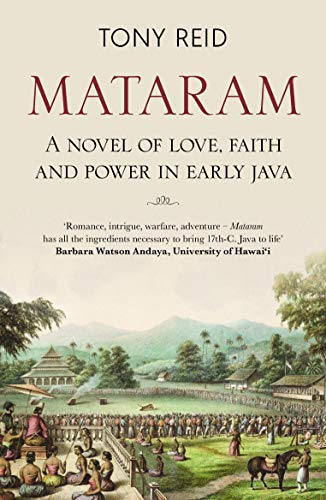Glory and riches – or
death and dishonor


Here’s a chance for foreigners bedazzled by this archipelago
of astonishments to better their knowledge of its history and cultures.
Not through texts hammered by pedestrian academics clumsy at
tale-telling, but through fiction.
Mataram was once a powerful Sultanate based on the lands
dominated by Central Java’s Mount Merapi, and the cities of Yogyakarta and Surakarta before the
Dutch took control.
Mataram is also a
novel from a near octogenarian scholar who’s let his creativity roam free after
a lifetime of formal study trampled by footnotes. That leaves the way clear to introduce Tony Reid’s
creation, a ginger-bearded seaman from Hampshire with a sinking marriage. His adventures help us better understand Java
four centuries ago.
Thomas Hodges had little to warrant his inclusion as
master’s mate in an imagined 1608 English trading venture to the East Indies – but for one skill. He was a natural linguist fluent in
Portuguese, then the outsider’s lingua franca of commerce; he learned the
language while shipping wine to Britain.
The Red Dragon
makes landfall at Bantam (now Banten) in West Java
after a long voyage, becalmed for a month and stricken by disease causing five
deaths. Hodges is sent ashore into a ‘town with no friends and little law’ to
negotiate the bulk purchase of pepper, much wanted in Europe.
While the crew quench thirst and lust, ‘Hod’ as he was soon
labeled, set about learning Malay and the culture to better deal with sellers. He also needed to rapidly understand the
complex cartels which controlled trade with the competing Dutch, Portuguese, Arabs,
Indians, and British. His venture was ‘glory and riches – or death and dishonor’.
Chinese intermediaries helped him build contacts – a role they
still play today. The impatient Englishman was also given lessons in Java-style
dealings with a trader called Bintara:
‘You feringgi (foreigners) will get nowhere unless you learn
patience in doing business. For us, trading is part of the art of civilized
living. If Tuan Hod wants Bintara’s favour, he will sit down, talk about
agreeable matters that interest Bintara, and wait until he is ready to learn
what you want. Then he will decide whether he wishes to help you.’
Good advice for non-Asians investors hoping to get into the
Indonesian economy in the 21st century.
Bintara has a daughter and it’s not long before Hodges has
forgotten his wife Margaret back in Britain. Along the way Sri teaches him the ‘wisdom of
the Javanese’; he gets to work out how to sit cross-legged on a hard floor and
not collapse from cramp, give gifts, eat with his right hand and chew betel
nut. Apart from this last habit, which
has largely been blown away by nicotine, the courtesies and traditions remain.
There are also diversions into debates about theology and
philosophy which give the author the chance to exercise some favorite personal theories.
These annoy as they seem artificial in the context of a young
couple wrestling with each other emotionally and practically over problems of
background and culture. Philosophical meanderings can be fun, but like sex
there’s a time and place.
What the reader wants to know is this: Will the gauche Brit adapt
fast enough to survive and get the cargo before keris are unsheathed and the keel holed?
After a mysterious spiritual session with an old soothsayer
our hero and Sri are set upon by street thugs resentful that an Inggris is stepping out with the local
prize.
She’s rescued by other women and vanishes. He beats off the bandits with his sword, cops
a flesh wound, then wonders if he’ll ever see the Javanese beauty again. By now we know the answer so there goes the
suspense, though we doubt they’ll live happily ever after.
The Red Dragon fills
its hold with spices and sails away leaving Hodges as a sort of honorary consul. The royalist stays to tell locals the Brits
aren’t as bad as the ‘grasping Dutch and swaggering Portuguese.’
This is fiction from the word-processor of a writer better
known in lecture halls under the more authoritative name Professor Dr Anthony
Reid; he’s a renowned New Zealand
historian who has spent his life on campuses in Australia,
Southeast Asia and the US.
He’s also translated many works in and out of Indonesian, a
language he started learning as a child in Jakarta. That was during the early 1950s when
Dad John was the UN’s Resident Rep.
Apparently Reid’s best known book (down a narrow corridor of
specialists) is the soporifically-titled Southeast Asia in the Age of Commerce, 1450-1680. Mataram
is his first novel using his research of the era, though few accurate written
records remain.
Reid admits to literary license: ‘As far as we know, neither Jesuits nor
English East India Company servants found their way to Mataram in the early
1600s, though both came close and did visit other great Asian kingdoms.’
The characters have lots to say, but rarely breathe. It
seems they people the pages to promote Reid’s eclectic interests. These include mixed marriages, the shift of cultures,
power struggles and faith. He introduces
a learned European Jesuit (and there’s still a few around today) who after much
preaching gets sick and dies, setting the scene for a chat about funeral
practices.
Hodges is incomplete.
Sometimes he’s an ignorant abroad, at others Captain Cool, then a seeker
of meaning. Only at the end do we learn
more about him from wife Sri.
Last month, Reid told The
Jakarta Post that he struggled with the dialogue of fiction; unfortunately
he didn’t win.
Nonetheless Mataram
is well worth buying or borrowing because it explains so many practices and
beliefs still relevant today, and does so in an easy read. Free of the gluten of academic jargon, so no worries
for those allergic to theses.
Mataram, by Tony
Reid
Monsoon Press, Leicester, 2018 336 pages.
(First published in The Jakarta Post 15 April 2019)
No comments:
Post a Comment